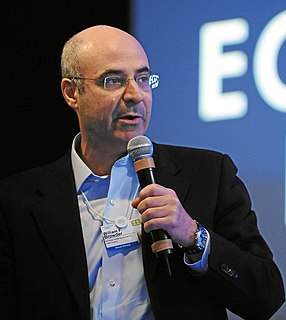A Quote by Alex Berenson
John W. Snow was paid more than $50 million in salary, bonus and stock in his nearly 12 years as chairman of the CSX Corporation, the railroad company. During that period, the company's profits fell, and its stock rose a bit more than half as much as that of the average big company.
Related Quotes
When you buy enough stocks to give you control of a target company, that's called mergers and acquisitions or corporate raiding. Hedge funds have been doing this, as well as corporate financial managers. With borrowed money you can take over or raid a foreign company too. So, you're having a monopolistic consolidation process that's pushed up the market, because in order to buy a company or arrange a merger, you have to offer more than the going stock-market price. You have to convince existing holders of a stock to sell out to you by paying them more than they'd otherwise get.
When you're in a start-up, the first ten people will determine whether the company succeeds or not. Each is 10 percent of the company. So why wouldn't you take as much time as necessary to find all the A players? If three were not so great, why would you want a company where 30 percent of your people are not so great? A small company depends on great people much more than a big company does.
Often, there is no correlation between the success of a company's operations and the success of its stock over a few months or even a few years. In the long term, there is a 100 percent correlation between the success of the company and the success of its stock. This disparity is the key to making money; it pays to be patient, and to own successful companies.
To the economically illiterate, if some company makes a million dollars in profit, this means that their products cost a million dollars more than they would have without profits. It never occurs to such people that these products might cost several million dollars more without the incentives to be efficient created by the prospect of profits.
At Travelers, we were much more opportunistic. It was very successful, but it wasn't an integrated financial services company. We had a property casualty company, a life company, a brokerage company. We were a financial conglomerate. It wasn't a unified, coordinated strategy of any sort. When it merged with Citi, that became a big issue; Citi, at that time, wasn't yet a fully integrated, coordinated company.
I saved $725 million on the 90 planes. Just 90. Now there are 3,000 planes that are going to be ordered. On 90 planes I saved $725 million. It's actually a little bit more than that, but it's $725 million. Gen. Mattis, who had to sign the deal when it came to his office, said, "I've never seen anything like this in my life." We went from a company that wanted more money for the planes to a company that cut. And the reason they cut - same planes, same everything - was because of me. I mean, because that's what I do.


































